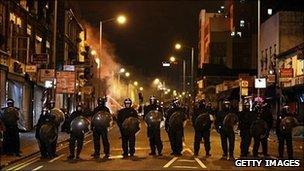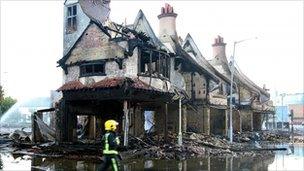Riots report: Public lacked faith in police response
- Published

Disorder spread from London to other English cities, including Birmingham and Manchester
A lack of confidence in the police response to the initial riots in London in August led to further disturbances across England, a report has concluded.
The Riots, Communities and Victims Panel found it had "encouraged people to test reactions in other areas".
The panel found there was no single cause of the riots, but said it was shocked at the "collective pessimism" among the young people it spoke to.
The Metropolitan Police said it was doing all it could to learn lessons.
In a statement, the force said it was possible the trouble would not have spread had there been "more officers available, more quickly".
Riots broke out in Tottenham, north London, on 6 August, two days after the fatal shooting by police of 29-year-old Mark Duggan. Unrest spread to other cities, including Manchester, Birmingham and Bristol.
The panel warned that such riots would happen again unless action was taken.
The independent panel looked at the causes of the riots, how communities responded and ways to avoid a recurrence.
Its 111-page report is based on visits to areas affected by the riots, as well as meetings at a young offenders institution with some of the perpetrators.
The panel said the initial riots had been triggered by the police's handling of the death of Mark Duggan, and in particular communication with his family, which was caused by the "breakdown of their protocols" with the Independent Police Complaints Commission.
It said rumours surrounding the shooting had not been countered effectively, and that "there is a fault line running between the IPCC and the police in this area", which it urged both parties to address.
The panel then said that if the police had responded more robustly to the riots which erupted firstly in Tottenham, and then across London, they would not have have happened elsewhere.
The panel said in its interim report, external: "Lack of confidence in the police response to the initial riots encouraged people to test reactions in other areas.
"Most of the riots began with some trouble in retail areas with a critical mass of individuals and groups converging on an area.
"Rioters believed they would be able to loot and damage without being challenged by the police. In the hardest-hit areas, they were correct."
It said research suggested that between 13,000 and 15,000 people had been actively involved in the riots.
'Sense of despair'
The report said: "We heard a range of motivations from the need for new trainers to a desire to attack society."
It added: "Lives were lost. Parents had to carry children out of burning homes, leaving a lifetime of possessions behind to be destroyed.
"Shopkeepers lost everything they had built up over many years. The consequences of the riots are still being felt.
"In many areas, there is an overriding sense of despair that people could destroy their own communities."
The panel also called for an overhaul of the 1886 Riot Damages Act, used by 5,700 businesses and homeowners so far to claim compensation from a Home Office fund administered by police authorities following the riots.
The panel said it had not heard from anyone who had received a payment under the scheme, and forecast that by next March half of the smallest claims and nine out of the 10 of the largest claims would still be outstanding.
The panel's other recommendations included:
Prompting the insurance industry to address poor service, after complaints about the speed and treatment of claims
A government fund to help high streets that are still suffering from a decline in business after the riots
A need for the police to strike a balance between protecting business premises on the one hand, and people and homes on the other
The authorities should review how they help people caught up in riot areas, including the creation of certain sites as "safe havens"
Police stop and search powers need immediate attention to ensure that community support and confidence is not undermined
The police should immediately review emergency planning to ensure they can deal with public disorder on the scale of the August riots
Panel chairman, former JobCentre Plus chief Darra Singh, said: "It is 30 years since the publication of the Scarman report [into rioting in Brixton, south London, in 1981].
Key themes
"The panel is clear that the riots in August were very different disturbances to those in 1981. However, it is a sad fact that in some respects, the underlying challenges are strikingly similar.
"While deprivation is not an excuse for criminal behaviour, we must seek to tackle the underlying causes of the riots, or they will happen again.
"Our findings have led us to set out recommendations for immediate action by individuals, government, public services and business. The threat of future riots and the response to them is not somebody else's problem."

The Reeves furniture store in Croydon was left a burned out shell following the public disorder
The panel said it would look at "key themes" including lack of hope for young people, parenting, consumerism, multiple offenders and police relations with the public.
Its full findings are expected to be published in March 2012.
The panel was announced by Deputy Prime Minister Nick Clegg in August and a "national call for evidence" was launched in September.
It came after the Ministry of Justice published the most comprehensive data yet, external on the rioting.
The statistics showed that three-quarters of those already brought before the courts for the disturbances had previous convictions - and a quarter of those had committed more than 10 offences.
The Cabinet Office separately commissioned fuller research into the areas affected.
'Entrenched problems'
"We are doing everything we can to learn from the summer's events," the Metropolitan Police said in its statement.
"However, this should not take away from the bravery and courageousness of the thousands of officers who, as the panel acknowledge, put themselves in danger to try to protect Londoners."
Nick Starling, of the Association of British Insurers, said the organisation did not accept that the insurance industry had not performed well.
"Insurers pulled out all the stops to help policyholders affected and expect to pay out around £200m to help people get back on their feet," he said.
Communities Secretary Eric Pickles welcomed the panel's report.
He said: "We are embarked on a programme of action to tackle entrenched problems like the most troubled families, educational attainment and many other fundamental issues which can give people a stake in society and prevent such disorder from happening again."
Shadow home secretary Yvette Cooper said the report showed "the government needs to act urgently to deliver the support David Cameron promised to victims and communities".